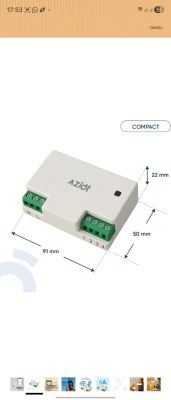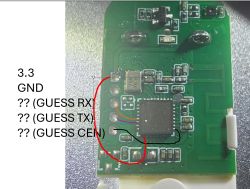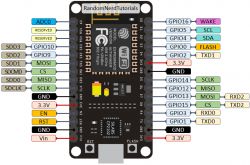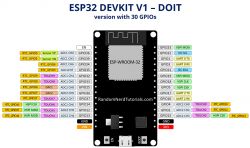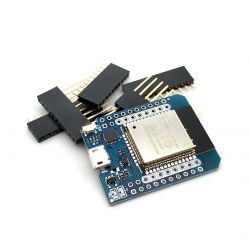FAQ
TL;DR: A 6–24 V NodeMCU base plus an ESP32 DevKit can cook hardware; “some ESP32 pins are shorted to ground and power.” Unplug the base and power by USB to test. [Elektroda, khoam, post #18560293]
Why it matters: This FAQ helps makers using ESP32 DevKit with expansion boards diagnose burn-ups and prevent repeat failures.
Quick-Facts
- NodeMCU Base targets ESP8266; inserting an ESP32 DevKit can tie ESP32 pins to GND/VCC, causing shorts and heat. [Elektroda, khoam, post #18560293]
- The base in question claims 6–24 V input; failure occurred with a 12 V Li‑ion pack connected. [Elektroda, prem111, post #18559944]
- Newer ESP32 DevKit versions expose more than 30 pins, increasing misalignment risk with ESP8266-only bases. [Elektroda, khoam, post #18560712]
- If the ESP32 heats quickly and LEDs stay off even on USB, the board is likely damaged. [Elektroda, prem111, post #18560308]
Quick Facts
- NodeMCU Base targets ESP8266; inserting an ESP32 DevKit can tie ESP32 pins to GND/VCC, causing shorts and heat. [Elektroda, khoam, post #18560293]
- The base in question claims 6–24 V input; failure occurred with a 12 V Li‑ion pack connected. [Elektroda, prem111, post #18559944]
- Newer ESP32 DevKit versions expose more than 30 pins, increasing misalignment risk with ESP8266-only bases. [Elektroda, khoam, post #18560712]
- If the ESP32 heats quickly and LEDs stay off even on USB, the board is likely damaged. [Elektroda, prem111, post #18560308]
What likely caused my ESP32 to burn when plugged into a NodeMCU base?
The NodeMCU Base is for ESP8266, not ESP32. Pin functions differ, so the base can short ESP32 pins to ground or power. That creates high current and rapid overheating. As one expert noted, “some ESP32 pins are shorted to ground and power.” Remove the base and test via USB. [Elektroda, khoam, post #18560293]
Why did it work for months and then fail suddenly?
It stayed safe while your firmware avoided driving the “critical” pins that the base miswired. A reboot, script change, or different runtime state could have driven one of those pins as an output, triggering an immediate short. “As long as you did not drive these ‘critical’ pins as outputs, nothing bad happened.” This edge case explains delayed failure. [Elektroda, khoam, post #18560341]
How can I confirm if the ESP32 DevKit is dead?
Remove it from the base. Power by micro‑USB only. If LEDs stay off and the module heats rapidly, the SoC or regulator is likely shorted internally. The forum case shows exactly this symptom after isolating the board from the base. Replacement is usually the only fix. [Elektroda, prem111, post #18560308]
Is the base’s 6–24 V input what killed the board?
Unlikely by itself. The base’s regulator handles the 12 V pack. The real risk came from pin-incompatibility between ESP8266 bases and ESP32 DevKit, which can short ESP32 pins to GND/VCC. That short causes heat and failure independent of input voltage. [Elektroda, khoam, post #18560293]
Are NodeMCU Base boards pin‑compatible with ESP32 DevKit?
No. They target ESP8266, and several signals map differently on ESP32. Inserting an ESP32 DevKit can connect certain ESP32 pins directly to ground or power. That miswiring risks permanent damage. Always verify pin maps before mixing hardware. [Elektroda, khoam, post #18560293]
How do I safely test my ESP32 after a suspected short?
- Remove the ESP32 from any base or shield.
- Power only via micro‑USB from a PC and observe LEDs/temperature.
- If it boots normally, map pins carefully before reconnecting any base; otherwise, replace the board.
[Elektroda, khoam, post #18560293]
Could my MicroPython code have caused the failure?
Yes, indirectly. Your code might have driven a miswired, “critical” pin as an output. That turns a latent mismatch into a hard short through the base. The hardware mapping caused the risk; the firmware state triggered it. “As long as you did not drive these ‘critical’ pins as outputs, nothing bad happened.” [Elektroda, khoam, post #18560341]
What symptoms indicate irreversible damage?
Rapid self‑heating, no status LEDs, and even visible steaming are red flags. If these persist when powered by USB alone, the module’s SoC or on‑board regulator has likely failed. Do not keep powering it to avoid further damage or hazards. [Elektroda, prem111, post #18559944]
Can I power the ESP32 DevKit by USB only?
Yes. Isolate the board and power it through the micro‑USB port for a known‑good 5 V supply. This is the recommended first check after removing any suspect base, as it avoids the base’s wiring entirely. If it still overheats, the board is damaged. [Elektroda, khoam, post #18560293]
What ESP32‑friendly alternatives to a NodeMCU Base are suggested?
Use a D1 mini ESP32 with dual‑row headers; it’s available in Poland and makes attaching RF modules easier. This approach avoids ESP8266‑only bases and gives cleaner mechanical mounting for enclosures. [Elektroda, khoam, post #18560803]
Is there an ESP32 IO Shield like NodeMCU Base?
Yes, for example the keyestudio ESP32 IO Shield. Availability can be limited locally; one user noted it wasn’t available in Poland at the time. Consider sourcing alternatives or using header‑based boards instead. [Elektroda, prem111, post #18560719]
Any quick mounting trick if I dislike full breadboards?
Split a standard breadboard in the middle. Seat the left and right pin rows in separate halves. You’ll gain a gap for wiring while keeping the board compact for enclosures. It’s a simple, low‑cost mechanical workaround. [Elektroda, Anonymous, post #18617037]
Do newer ESP32 DevKits with >30 pins change compatibility?
They increase misalignment risk with ESP8266‑only bases. As one expert noted, “newer versions of ESP32 DevKit have more leads than 30.” That difference makes accidental shorts more likely on fixed‑routing bases. Use ESP32‑specific carriers. [Elektroda, khoam, post #18560712]
What should I do next if mine overheats on USB too?
Stop powering it. The board is likely irreparably damaged. Replace the ESP32 DevKit and avoid using ESP8266‑only bases. Power the new board via USB first, then add peripherals after verifying pin maps. This prevents repeat failures. [Elektroda, prem111, post #18560308]
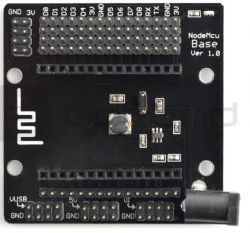 .
.
 .
.





